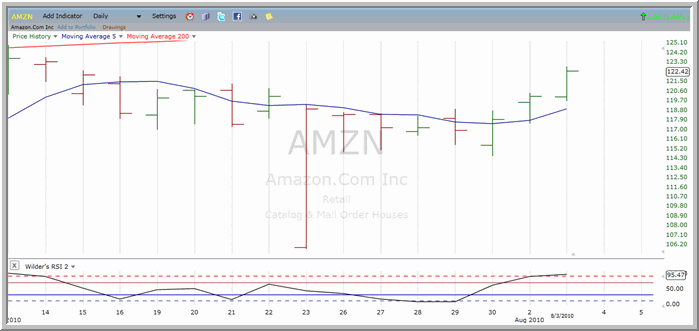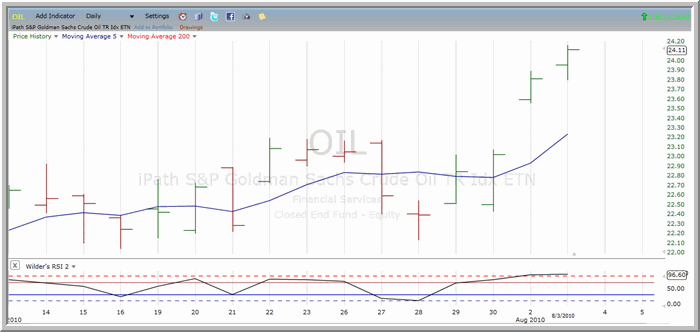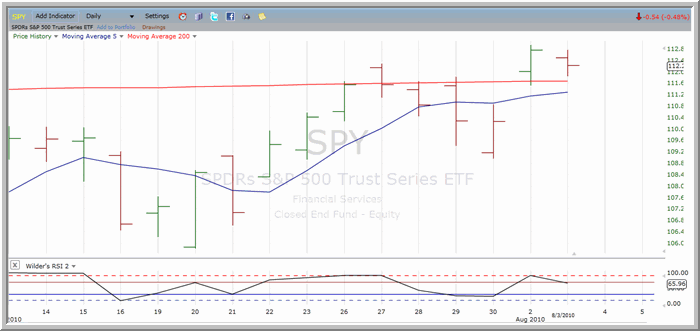High Probability Trading: Strategies for Overbought Energies (OIL, XLE, USO) and a SPY Update
In some ways, the race to the 200-day has been replaced by a dance around it.
As traders try and figure out whether or not we are back in bull market mode or headed for more sharp declines, we are sticking with the quantified, high probability trading strategy of buying oversold markets and selling overbought ones. This methodology has succeeded in bull markets, bear markets and sideways markets, making high probability trading a worthwhile option for traders looking to find the best stocks and ETFs to trade every day.
Stocks
A number of stocks that had become overbought below the 200-day moving average reversed on Tuesday. This includes stocks like ^JPM^, which slid by more than 1% after creeping into overbought territory below the 200-day, as well as ^MON^, ^AA^ and ^FCX^. Note that all of these stocks were highlighted in yesterday’s High Probability Trading report.
Meanwhile, joining the ranks of the overbought, below the 200-day, are safety stocks like ^PFE^, which soared more than 5% on Tuesday, and ^AMZN^ (below). Amazon.com added nearly 2% in closing higher for a third session in a row below the 200-day.

Going forward, the selling on Tuesday has helped bring a number of stocks lower, but few have fallen anywhere close to oversold territory above the 200-day. Another day or two of selling, however, could provide opportunity for high probability traders to begin picking up shares of newly oversold stocks.
Learn how to trade stocks like Amazon.com, Monsanto and Pfizer using quantified, backtested short term trading techniques in the book by Larry Connors and Cesar Alvarez, Short Term Trading Strategies That Work – now in paperback.
Exchange-traded Funds (ETFs)/Leveraged ETFs
A few minutes into running the High Probability ETF Trading Most Overbought/Most Oversold screen after the close on Tuesday, it was clear that commodity-based exchange-traded funds (ETFs) – especially those linked to oil and energy – were among the most overbought.
Traders looking for bargains should look elsewhere. Our research into the short term price movement of exchange-traded funds shows that when ETFs become overbought in the short term, they tend to underperform and are best avoided – or sold short.
With that in mind, traders interested in opportunities on the short side may want to keep some of these overbought oil and energy ETFs on their watchlists.
With exceptionally high 2-period RSI values, exchange-traded funds like the ^DBO^ and the ^OIL^ (below) have both closed higher for four days in a row below the 200-day moving average.

Other oil and gas related ETFs that have become overbought below the 200-day moving average include the ^USO^ and the ^DIG^.
SPY Update
If you are new to high probability trading, then one great way to understand how high probability trading works is to just follow the ^SPY^.

High probability traders have been focused primarily on the short side of trading the SPY over the past few months – ever since the ETF closed below the 200-day moving average. Rallies into overbought territory below the 200-day in early June and again in July provided excellent opportunities for high probability traders to take advantage of the quantified, mean reversion tendencies of equity ETFs like the SPY.
Currently trading above its 200-day, high probability traders now need to consider the possibility of trading the SPY to the long side. Should the ETF close in oversold territory above the 200-day moving average over the next few days, then high probability traders will find themselves on the other side of the kind of trades they were making in the SPY only a few weeks ago.
With Larry Connors’ High Probability ETF Trading Software, short term traders have access to the same kind of “buy the selling, sell the buying” trading strategies that professional traders have used successfully for decades.
Click here to start your free trial to Larry Connors’ High Probability ETF Trading Software today!
David Penn is Editor in Chief at TradingMarkets.com.
